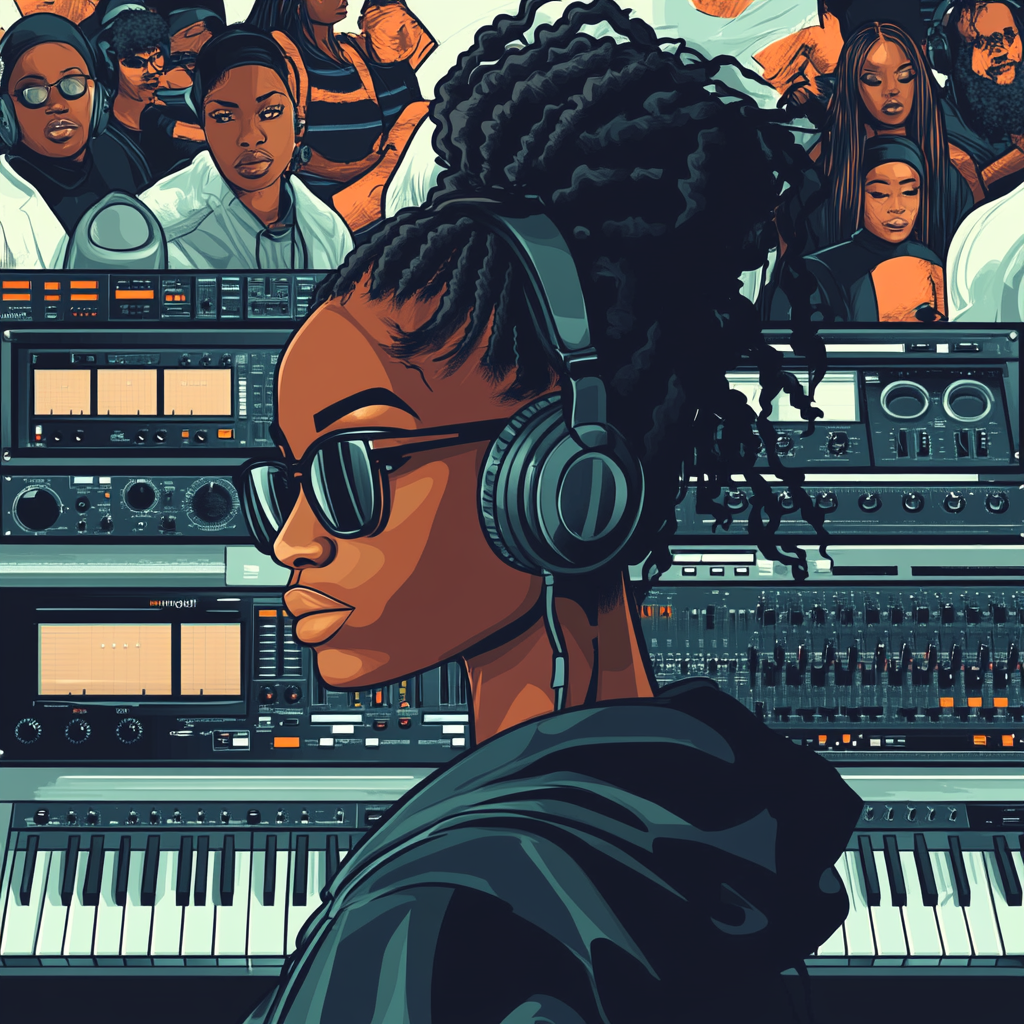
Black music has been the driving force behind countless innovations that have transformed the global music landscape. From the soulful rhythms of jazz to the pulsating beats of hip-hop, African American artists have consistently pushed the boundaries of musical expression, leaving an indelible mark on production techniques worldwide.
The Evolution of Black Music: A Journey Through Time
The story of Black music is one of resilience, creativity, and innovation. It began with the rhythmic beats of African drums, evolved through spirituals and blues, and blossomed into the diverse genres we know today[3]. Each era brought new techniques and technologies that would reshape the music industry.
Jazz: The First Revolution
Jazz, born in the early 20th century, introduced improvisation and complex harmonies that challenged traditional Western music theory. Artists like Louis Armstrong and Duke Ellington pioneered recording techniques that captured the spontaneity of live performances, setting new standards for studio production.
Soul and R&B: The Heart of Innovation
In the 1960s and 70s, soul and R&B artists like Aretha Franklin and Marvin Gaye brought a new level of emotional depth to recordings. Their powerful vocals demanded innovative microphone techniques and mixing strategies, influencing producers across genres.
Hip-Hop: The Game Changer
Hip-hop emerged as a cultural force in the 1970s, revolutionizing music production in ways that continue to resonate today. The genre’s innovative approach to sound creation and manipulation has had a profound impact on the global music scene.
“Sampling isn’t just a technique—it’s a Black music innovation that transformed music into a global conversation.”
Sampling: A New Art Form
Hip-hop producers turned sampling into an art form, repurposing snippets of existing recordings to create entirely new compositions. This technique not only changed how music was made but also challenged copyright laws and sparked debates about artistic ownership.
Drum Machines and Digital Production
The introduction of drum machines and digital audio workstations (DAWs) in hip-hop production democratized music-making. Suddenly, artists could create professional-sounding tracks without access to expensive studio equipment. This shift empowered a new generation of Black musicians and producers to share their voices with the world.

“Black women have always been innovators, shaping music production behind the scenes with creativity and power.”
Black Women: Pioneers in Music Technology
While often overlooked, Black women have been at the forefront of musical innovation. Artists like Missy Elliott and Lauryn Hill have not only created groundbreaking music but also pushed the boundaries of production techniques.
Missy Elliott: The Futuristic Visionary
Missy Elliott’s futuristic sound and avant-garde music videos challenged industry norms and inspired a new generation of producers. Her innovative use of electronic sounds and unconventional song structures paved the way for experimental production techniques in mainstream pop music.
Lauryn Hill: Blending Genres and Cultures
Lauryn Hill’s masterpiece “The Miseducation of Lauryn Hill” seamlessly blended hip-hop, soul, and reggae, showcasing the power of cross-cultural musical fusion. Her approach to production, which emphasized live instrumentation alongside sampled elements, influenced producers across genres.
The Global Impact of Black Music Innovation
The innovations pioneered by Black artists have resonated far beyond the borders of the United States. From the UK grime scene to South African kwaito, music producers worldwide have drawn inspiration from African American production techniques.
K-Pop’s Hip-Hop Influence
The billion-dollar K-Pop industry owes much of its sound to Black music innovations. Korean producers have adapted hip-hop’s hard-hitting beats and layered production style, creating a unique fusion that has taken the world by storm.
Electronic Dance Music (EDM) and Black Rhythms
Even electronic dance music, often associated with European DJs, has deep roots in Black music. The driving rhythms of house and techno can be traced back to the disco and funk grooves pioneered by Black artists in the 1970s.

The Future of Black Music Production
As we look to the future, Black artists continue to be at the forefront of music production innovation. From the use of artificial intelligence in beat-making to virtual reality music experiences, African American creators are shaping the next wave of musical technology.
AI-Assisted Composition
Emerging technologies like AI-assisted composition tools are being embraced by Black producers, opening up new possibilities for creative expression. These tools can generate unique chord progressions and melodies, serving as a springboard for human creativity.
Blockchain and Music Ownership
Blockchain technology offers a potential solution to long-standing issues of artist compensation and copyright protection in the music industry. Black artists and entrepreneurs are at the forefront of exploring how this technology can create a more equitable music ecosystem.
Conclusion
The story of Black music is one of constant innovation and reinvention. From the earliest spirituals to the latest digital productions, African American artists have consistently pushed the boundaries of what’s possible in music. As we celebrate these achievements, it’s crucial to recognize the ongoing contributions of Black musicians and producers to the global music landscape.
By understanding and appreciating the rich history of Black music innovation, we can ensure that future generations of artists continue to receive the recognition and opportunities they deserve. Let’s honor this legacy by supporting Black artists, investing in music education, and fostering an inclusive music industry that values diversity and creativity.


